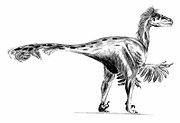
Foremost Formation
Encyclopedia
The Foremost Formation is a geological formation in Alberta, Canada whose strata date back to the Late Cretaceous
. Dinosaur remains are among the fossils that have been recovered from the formation.
, Horseshoe Canyon Formation
, and Scollard Formation
. This is primarily due to their lower total fossil quantity and neglect from collectors who are hindered by the isolation and scarcity of exposed outcrops. Their dinosaur fossils are primarily teeth recovered from microvertebrate fossil sites.
Late Cretaceous
The Late Cretaceous is the younger of two epochs into which the Cretaceous period is divided in the geologic timescale. Rock strata from this epoch form the Upper Cretaceous series...
. Dinosaur remains are among the fossils that have been recovered from the formation.
Dinosaurs
The Foremost Formation has a lower diversity of documented dinosurs than units like the Dinosaur Park FormationDinosaur Park Formation
The Dinosaur Park Formation is the uppermost member of the Judith River Group, a major geologic unit in southern Alberta. It was laid down over a period of time between about 76.5 and 75 million years ago. The formation is made up of deposits of a high-sinuosity fluvial system, and is capped...
, Horseshoe Canyon Formation
Horseshoe Canyon Formation
The Horseshoe Canyon Formation is part of the Edmonton Group and is up to 230m in thickness. It is Late Campanian to Early Maastrichtian in age and is composed of mudstone, sandstone, and carbonaceous shales...
, and Scollard Formation
Scollard Formation
-References:* Ryan, M. J., and Russell, A. P., 2001. Dinosaurs of Alberta : In: Mesozoic Vertebrate Life, edited by Tanke, D. H., and Carpenter, K., Indiana University Press, pp. 279-297....
. This is primarily due to their lower total fossil quantity and neglect from collectors who are hindered by the isolation and scarcity of exposed outcrops. Their dinosaur fossils are primarily teeth recovered from microvertebrate fossil sites.
| Dinosaur Dinosaur Dinosaurs are a diverse group of animals of the clade and superorder Dinosauria. They were the dominant terrestrial vertebrates for over 160 million years, from the late Triassic period until the end of the Cretaceous , when the Cretaceous–Paleogene extinction event led to the extinction of... s reported from the Foremost Formation |
||||||
|---|---|---|---|---|---|---|
| Genus | Species | Location | Stratigraphic position | Material | Description | Images |
Aublysodon Aublysodon Aublysodon is a name given to a large number of carnivorous dinosaur teeth of a certain form found in numerous late Cretaceous period geological formations... |
Indeterminate |
  |
||||
Colepiocephale Colepiocephale Colepiocephale is a genus of pachycephalosaurid dinosaur from Late Cretaceous deposits of Alberta, Canada. It was collected from the Foremost Formation . The type species, C. lambei, was originally described by Sternberg , and later renamed by Sullivan in 2003. C... |
C. lambei |
|||||
Dromaeosaurus Dromaeosaurus Dromaeosaurus was a genus of theropod dinosaur which lived during the Late Cretaceous period , sometime between 76.5 and 74.8 million years ago, in the western United States and Alberta, Canada. The name means 'running lizard'.... |
Indeterminate |
|||||
Hesperornis Hesperornis Hesperornis is a genus of flightless aquatic birds that spanned the first half of the Campanian age of the Late Cretaceous period . One of the lesser-known discoveries of the paleontologist O. C. Marsh in the late 19th century Bone Wars, it was an important early find in the history of avian... |
H. regalis |
|||||
Paronychodon Paronychodon Paronychodon was a theropod dinosaur genus. It is a tooth taxon, considered dubious because of the fragmentary nature of the fossils, which include "buckets" of teeth but no other remains... |
Indeterminate |
|||||
Richardoestesia |
Indeterminate |
|||||
Saurornitholestes Saurornitholestes Saurornitholestes is a genus of carnivorous dromaeosaurid theropod dinosaur from the late Cretaceous of Alberta, Montana and New Mexico.... |
Indeterminate |
|||||
Stegoceras Stegoceras Stegoceras is a genus of plant-eating pachycephalosaurid dinosaur that lived in what is now North America during the Late Cretaceous period.... |
Indeterminate |
|||||

